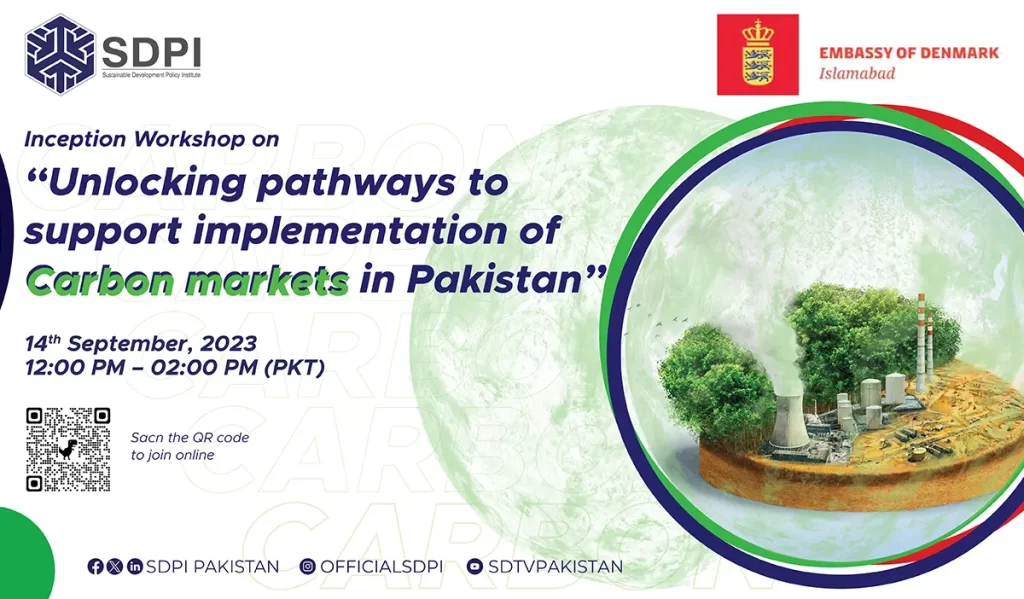
SDPI & Embassy of Denmark collaborate to spearhead ‘Unlocking Pathways for Carbon Market Implementation in Pakistan’ project
ISLAMABAD ( Web News )
Sustainable Development Policy Institute (SDPI) in collaboration with Embassy of Denmark in Pakistan have jointly organized project inception workshop “Unlocking pathways to support implementation of carbon markets in Pakistan”.
The project aims to conduct need assessment for knowledge and capacity gaps for implementation framework of carbon markets in Pakistan, assess potential regulatory and information barriers, identify potential opportunities and challenges in implementation of carbon markets across different sectors in Pakistan, potential investment opportunities created by carbon markets in Pakistan, with a particular emphasis on building Public-Private Partnerships (PPPs). Under this project, the two organization aim to provide an actionable work plan to effectively implement Carbon Markets in Pakistan learning from best practices of Denmark for SDG13-Climate Action and SDG 17-Partnerships for Goals.
Speaking at the inception workshop, Dr. Abid Qaiyum Suleri, Executive Director, SDPI said that unleashing the potential of carbon credits and financing offer benefits of harnessing the challenge of climate change, greenhouse gas emissions, and can also address the foreign exchange deficit crisis for Pakistan. This requires identifying a focal point among ministries and building their capacity to anchor projects on carbon markets. With collaboration of Embassy of Denmark, SDPI aims to serve bridge the gap between knowledge pool and policy makers to create conducive environment where Pakistan can unleash and avail the due share of the low hanging fruits of global carbon markets, he remarked.
Dr. Khalid Waleed, Research Fellow and Lead Researcher, Energy Unit, SDPI stressed on integrating sustainable energy and environment in macro-economic policies, develop industry of environmental sustainability initiatives like carbon markets, permaculture, and circular economy market to attract foreign direct investments and interlink inter-industry regional and international carbon trading. This will enable prevention of environmental degradation and increasing income levels for sustainable economic growth in Pakistan in parallel. He urged for increasing taxation on carbon intensive goods and industries and offering carbon market credits and offsets to increase carbon compliance. Highlighting the potential of carbon markets, he said that low carbon energy solutions alone can generate US$10 billion annually. He further said that firewood is emission intensive and with natural gas resources depleting in Pakistan, carbon markets can provide alternative green fuels.
Syeda Hadika Jamshaid, Carbon Market Advisor, Ministry of Climate Change and Environmental Coordination, informed that the Ministry has signed MoU with Verra to develop Voluntary Carbon Market (VCM), develop capacity of private sector and align the MOCC as Convener for VCMs. She further elucidated that MoCC is also developing a guiding policy document to create a conducive environment, capacity, and awareness for carbon trading in the country. She stressed that attracting international investors is hinged on policy clarity and consistency and urged on working on projects which can generate co-benefits rather than conventional projects.
Syed Aqeel Hussain Jafri, Director (Policy), Private Power & Infrastructure Board, renewable energy can play an integral role in carbon markets, with the private sector eager for mobilizing and operationalizing carbon market structures in the country. Carbon markets will not only aid in achieving Nationally Determined Contributions (NDCs) but will also pivot finances for low carbon technologies, he said.
Ashok K. Chandhel, Senior Program Officer, Auditor and Accreditation Body Engagement at Verra, elucidating the initiatives being jointly steered by MoCC and Verra, informed that Verra will assist in developing capacity of Ministry officials, operating the registry for carbon markets, verification, and methodology for carbon market projects.
Dr. Omar Mukhtar Khan, Team Leader, Sustainable Energy and Economic Development (SEED) stressed capitalizing forests and renewable energy projects to strengthen climate action and promoting economic growth through carbon credits.
Vardah Malik, CEO of Profectus Advisory Services, stressed on diversifying the carbon projects to include electric vehicles, carbon capture and storage, wind, solar energy, hydrogen fuels, plastic credits etc. and highlighted that Pakistan is much behind other countries, thus losing competitive edge. She stressed that Danish experience could help Pakistan in engaging national large private corporates especially hard to abate sectors.
Lydia Omuko-Jung, Senior Legal Consultant, Climate Focus, highlighted that the issue of lack of public sector capacity for developing carbon markets is a common issue faced by many countries. The key lies in understanding that the public sector must create incentives for private sector rather than focus solely on developing regulatory frameworks.
